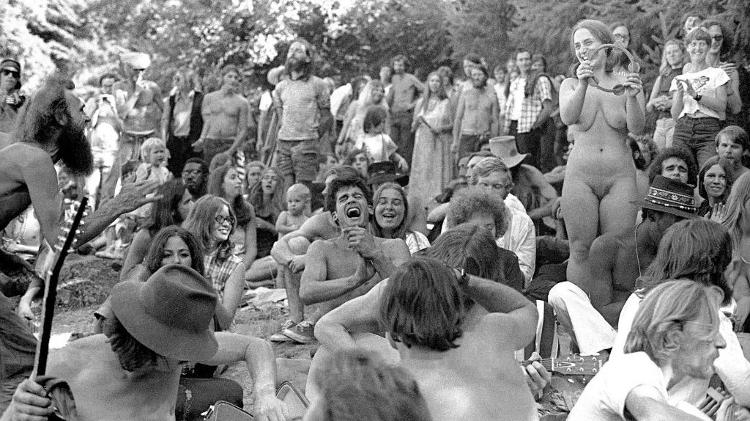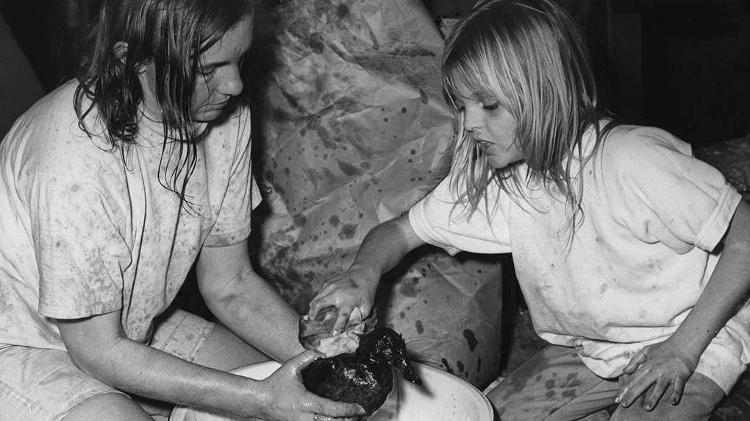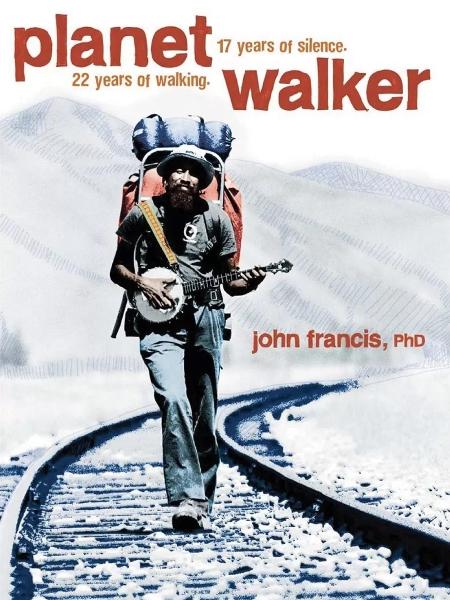As a young hippie, American John Francis made a life-changing decision: stop talking. He remained silent for 17 years until he realized that he really had something to say.
It all started with an environmental disaster. In 1971, a collision between two oil tankers polluting San Francisco Bay, California (USA) with more than half a million gallons of oil.
“I heard about it and wanted to see it, so I went from my small town of Inverness to San Francisco. I saw people cleaning up in small groups on the beach. They would go into the water and come out with seabirds – pelicans, gulls – and cormorants – covered in oil.”
That scene where people try to save the birds affected him so much that he felt he had to do something.
“I thought, ‘I don’t want to drive anymore.’ That was in the hippie days and I was definitely a bit of a hippie and I decided that’s what I was going to do.”
It is worth remembering that this happened in California in the 1970s. Everyone was going everywhere, so it was a brave move to abandon motor vehicles altogether.
John found himself walking alone.
“I thought everybody would walk with me because the oil spill affected people so much that they were saying things like ‘I’m going to stop driving.’ So it wasn’t weird for me to say that.”
“However, when I did (what I said) I was told, ‘What are you doing this for? It’s crazy! Nothing will change.'”
“But as my mother said, I was stubborn and kept walking.”
“While I was doing that, something started to happen. I started to like it. I started to like living where I live, not getting in my car and not going into town, not shopping in stores… I became a part of it. where I live. where I live.”
discussions
Gradually, John realized that his world was expanding rather than shrinking from being so local.
“Isn’t it great? Because I was moving so fast before, I had very little time to understand what was around me; getting out of the car was an opportunity to experience my surroundings at human speed.”
However, his decision caused controversy.
“People would argue with me about whether one person could make a difference.”
Drivers criticized him for making them feel bad or wanting them to feel bad, and John defended himself… until he got tired of his own voice.
A gift
On the eve of his 27th birthday, John was reading “The Hobbit” by JRR Tolkien and he had an idea.
“Readers know that when hobbits have a birthday, they don’t expect to receive gifts, they give them.”
As she spoke her mind, she decided what her gift to others might be: “I will stop talking that day.”
“I got up that morning and was quiet.”
But with so much exchange on a normal day… how could he resist talking?
“It was very interesting because people had so much to say and I just listened to their surprise and joy.”
“It was revealing for me because I heard people say it, maybe for the first time.”
“Until now, when they started talking to me, I used to think about what to answer, how to tell them that I was wrong and right.”
“I realized that I didn’t listen to anyone during this 24-hour vow of silence, and now that I’m listening, I can learn something.”
I thought, “I’ll shut up another day,” which turned into another day and then a week.”
But what did his friends say: did they encourage or deter him?
“My girlfriend was really happy at first, but after a week or so she wanted to know when to stop. And a lot of people thought I was a little crazy… I wondered to myself if I was crazy.”
And then why didn’t he speak again?
“Because it felt good, I realized that I was learning. I really felt that walking in nature was a place I had to explore. It was something I had to do.”
“For the first few weeks, I had a lot of conversations in my head about what to say and when to start talking, until I finally decided it would stay that way for a year.”
“And once I decided, everything calmed down and I settled into silence and silence fell over me.”
This is a fascinating phrase: “Silence has fallen on me”.
What is the emotion?
“Oh, that’s great! I was almost chosen to be that person and I was so grateful. It’s like a gift. I’m starting to think I’m giving a gift to my community, and it’s finally a gift to me too.”
The beginning of a journey
John decided not to speak for a year and began touring the United States.
He carried his sleeping bag on his back and camped under the stars, doing odd jobs along the way.
He improvised sign language and used a lot of mime to understand himself. Later, when newspapers started writing about him, he would cut out articles to use as a business card.
In addition to walking, John played and played a banjo, his faithful companion.
When his next birthday came, he reconsidered his decision and stayed quiet for another year… and another year and another year…
It’s been seventeen years where he “explored so much by walking from California to Oregon and into the wilderness.”
He also returned to reading so that he could graduate quietly.
“I remember going to the registrar’s office (at the University of Southern Oregon, Ashland) and not speaking and trying to explain to him that I wanted to study.”
“I sat in front of him and bowed my head like Rodin’s ‘The Thinker’ and then clasped my palms open like a book and pretended to read.
“So you want to read and learn to think here?” said John, the university official. He repeated the sequence until he asked.
“I shook my head.”
close the loop
She earned a bachelor’s degree and contacted the University of Montana to apply for a master’s program in environmental studies.
“I can do it in two years,” he wrote, and began walking.
He had no money when he arrived.
“The program manager said, ‘John, are you ready to work?’ I emptied my pockets and said, ‘Oh, you don’t have any money!’ I shook my head and said, ‘Come tomorrow’.”
The next day, “he gave me $150 and said, ‘Sign up for the loan,’ so I did. He said, ‘All the teachers said they’d let you take classes for free.'”
He completed his master’s degree with the thesis “Pilgrimage and change: war, peace and the environment” (1986).
“These things became the core of my thoughts when I finished my walk in the USA.”
Along the way, he earned a PhD in land resources at the University of Wisconsin at Madison.
His thesis was about what motivated his quiet walk: oil spills.
Message
Doors began to open.
The US government has been asked to advise on oil spills and draft regulations for them. The United Nations wanted him as an environmental ambassador…not bad for a hippie who one day decides to abandon motor vehicles and then stops talking!
“This is so surprising.”
Three degrees and almost twenty years later, John felt he had something to say and set a date in his diary to start talking again: January 2, 1990.
“I chose Earth Day because I wanted to talk about the environment, to include things that we traditionally think about – climate change, oil spills, pollution and things like that – how we treat each other.
“This is something I hadn’t heard in my studies, but it’s what I learned by walking and living with people from all over the country.”
What was the connection between caring for the environment and the mutual care he found?
“Connection was our first opportunity to explore or understand the way we treat each other as we are part of the environment, to treat the environment in a sustainable way, or even what we mean by sustainability.”
“For me, the environment has become human rights, civil rights, gender equality, and all the ways we interact, because it manifests itself in the physical environment that surrounds us.”
“For example, consider how we pollute the water without thinking of the people who need to clean the water.”
In other words, if we exploit each other, we are more likely to exploit the environment, and if we exploit the environment, we are more likely to exploit each other.
That was the message John wanted to convey, and he was willing to break his 17-year silence.
your voice
And what was it like to speak again for the first time in so long, in front of an audience that includes friends and family I haven’t spoken to in years?
“I did this at a hotel in Washington DC who offered to host a small event for me, and I invited some of my friends and family. There were also some media outlets – National Geographic, Los Angeles Times.”
“I played a bit of banjo and said, ‘Thanks for being here.’ My mom jumped out of her chair and said, ‘Thank God, Johnny’s talking! I thought, ‘How wonderful to see my mom so happy.’
“But since I hadn’t heard my voice for a long time, I didn’t really understand where it was coming from. I looked behind me to see who said what I was thinking.”
“I was so surprised that I started laughing and saw my father looking at me, and he thought, ‘Yeah, he’s really crazy.
Is that how spoken words entered your life… and cars?
“I walked everywhere, not caring about anything, and realized that I was a prisoner and that I had the keys to this prison and that I could be freed at any moment.”
“I’m using a hybrid now.”
Does he miss the times when he didn’t talk and just walked?
“Well, I’m still walking. I’ll actually be walking in Africa from August on. Also sometimes I don’t even speak for a day. Anyway, this 17 years of silence and 22 years of walking just don’t happen. Go.”
Would you advise others to do the same?
“I recommend that we listen to each other.”
– This text has been published actually inside https://www.bbc.com/portuguese/geral-62712184
*This report is based on chapter Why I stopped talking for 17 years (“Why I stopped talking for 17 years”) from the BBC radio show Outlook. You can do listen in full here (in English).
source: Noticias


